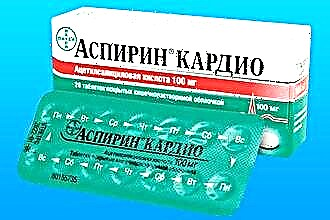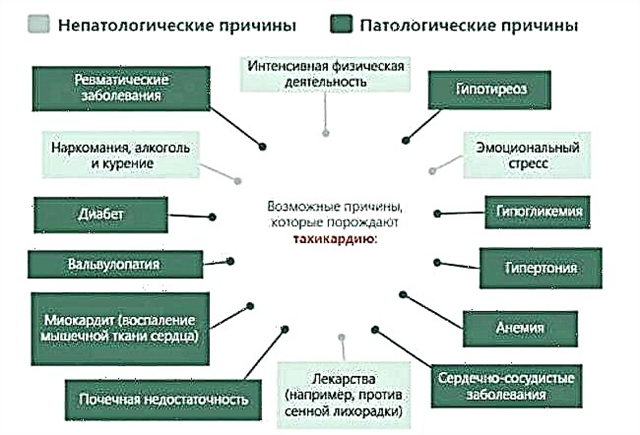Aspirin occupies a leading position in the prevention and treatment of complications of cardiovascular diseases. In the practice of a cardiologist and therapist, antiplatelet therapy is the gold standard that can reliably reduce mortality in patients with circulatory diseases. Aspirin Cardio affects the key risk factor - vascular thrombosis, which helps prevent the development of heart attack and stroke. To use the drug in most cases is shown for a long time, according to medical recommendations and data in the instructions.
Instructions for use
 Aspirin is one of the most well-known and commonly used drugs in modern medical practice. Refers to non-steroidal anti-inflammatory drugs (NSAIDs), salicylates. The active ingredient is acetylsalicylic acid (ASA), first discovered more than a hundred years ago. It was originally used as an antipyretic medicine, and it was not until the 90s that its other properties were studied. Currently, Aspirin is used as an analgesic (relieving pain), anti-inflammatory and antiplatelet agent. It is the gold standard for the prevention and treatment of cardiac and cerebrovascular complications. The official Aspirin Cardio is manufactured and manufactured by the German pharmaceutical firm Bayer.
Aspirin is one of the most well-known and commonly used drugs in modern medical practice. Refers to non-steroidal anti-inflammatory drugs (NSAIDs), salicylates. The active ingredient is acetylsalicylic acid (ASA), first discovered more than a hundred years ago. It was originally used as an antipyretic medicine, and it was not until the 90s that its other properties were studied. Currently, Aspirin is used as an analgesic (relieving pain), anti-inflammatory and antiplatelet agent. It is the gold standard for the prevention and treatment of cardiac and cerebrovascular complications. The official Aspirin Cardio is manufactured and manufactured by the German pharmaceutical firm Bayer.
The main mechanism of Aspirin is to stop the synthesis of arachidonic acid and prostaglandins (PG). These biologically active substances are secreted in almost all tissues, and have the greatest effect on pressure, vasospasm, inflammation, edema and pain. Acetylsalicylic acid, when it enters the bloodstream, inhibits the synthesis of PGs, thereby reducing the permeability of small blood vessels, and also reduces the temperature and inflammation.
In cardiological practice, aspirin has found its use as an antiplatelet agent. This is due to its effect on the substance thromboxane, which enhances the process of aggregation of red blood cells in the blood (gluing platelets into clots and the formation of blood clots). The drug eliminates vascular spasm, expands the lumen of arteries, veins and capillaries. This allows Aspirin Cardio to be used as a therapeutic and prophylactic agent for thrombosis.
Indications
As a means to reduce risk:
 morbidity and death in persons who have previously had acute myocardial infarction (AMI);
morbidity and death in persons who have previously had acute myocardial infarction (AMI);- for prophylaxis in case of suspected acute coronary syndrome, AMI;
- with a stable and unstable form of angina pectoris;
- when detecting transient ischemic (TIA) attacks of the brain, stroke in a patient with TIA;
- with MI in persons with concomitant complications: the presence of diabetes mellitus, hypertension, dyslipidemia, obesity, smoking in older / old age.
As a prophylactic agent:
- embolism (blockage of the lumen of blood vessels), including the pulmonary artery, after surgery, catheterization, bypass grafting;
- thrombosis of the veins of the lower extremities, other vessels after surgery or prolonged immobilization (lack of mobility);
- for the secondary prevention of the development of stroke (cerebrovascular accident) in patients of a very high risk group, with diseases of the cardiovascular, cerebrovascular systems.
Composition and release forms
The drug is produced in the form for oral administration, in a dosage of 100 or 300 milligrams of acetylsalicylic acid. Additionally, the tablet includes: starch, cellulose powder, talc and other components. The package contains white pills in a blister film shell. The peculiarity of the drug is an enteric form, due to which the effect on the gastric mucosa is minimized.
When taken orally, the drug is quickly and completely absorbed in the digestive tract, turning into the main metabolite - salicylic acid. Its minimum concentration is reached within 20 - 40 minutes. Due to a special membrane, it is released not in the acidic environment of the stomach, but in the alkaline pH of the intestine, due to which the absorption period is extended to 3 - 4 hours in comparison with ordinary Aspirin. In the process of absorption, the drug quickly binds to plasma proteins, can penetrate the placenta barrier, enter breast milk.
The very process of metabolism of salicylic acid takes place in the cells of the liver. Enzymatic reactions ensure the excretion of the drug, mainly by the kidneys in the urine. The time depends on the dose taken, on average it takes 10-15 hours with moderate dosages of 100 mg.
Method of administration and dosage
Aspirin Cardio should be taken orally with plenty of water without chewing. It is recommended to use it half an hour or an hour before meals, once a day. According to these instructions, it is not indicated for admission to children, especially under 16 years of age due to the high risk of side effects. The criteria and guidelines for adults are listed below:
 Primary prevention of AMI is 100 mg every day, in the evening, or 300 mg every two days. The same scheme is shown for individuals with a high risk group for coronary and cerebral complications.
Primary prevention of AMI is 100 mg every day, in the evening, or 300 mg every two days. The same scheme is shown for individuals with a high risk group for coronary and cerebral complications.- To prevent a second heart attack or in treatment regimens for a stable / unstable form of angina pectoris, it is 100-300 mg.
- With an unstable course of an attack of angina pectoris and a suspicion of a heart attack, take 300 mg once, chewing a tablet and drinking a glass of water while waiting for an ambulance. The next month, the maintenance dose for the prevention of recurrent AMI is 200 or 300 milligrams under the constant outpatient supervision of a doctor.
- As a prevention of the development of stroke against the background of transient (transient) ischemic attacks, 100-300 mg per day are shown.
- After the surgical intervention, 200-300 mg per day is prescribed, or 300 mg every two days. Also, the medicine is prescribed for use by bedridden patients, or persons after treatment and prolonged immobilization (significantly reduced motor activity).
Contraindications
Persons with hypersensitivity to the components of the drug (acetylsalicylic acid) or other salicylates should not take Aspirin Cardio. It is also not recommended to take pills with the development of an asthmatic or broncho-obstructive attack provoked by a drug from the NSAID group. Other criteria are listed below:
- Inflammatory or erosive diseases of the gastrointestinal tract (GIT). Gastritis, colitis in the acute stage or exacerbation.
- Condition after bleeding from ulcers; stomach ulcer.
- In the presence of hematological syndrome, diathesis with clotting disorders and a tendency to bleeding.
- The tendency to seasonal allergies (including drugs from the NSAID groups), bronchitis, bronchial asthma, polyposis.
- Gout, increased uric acid.
- Pregnancy or breastfeeding period.
- Children and adolescents under 18 years of age.
- Combined intake with cytostatics (Methotrexate at a dose of more than 15 mg).
- Renal and hepatic impairment.
- III and IV class of heart failure (severe with congestion).
Side effects
 On the part of the digestive system, general discomfort is most often noted, the appearance of reflux of gastric contents (heartburn and sour belching). Pain in the upper or middle abdomen may be troubling.If there is a history of stomach ulcers, inflammatory or erosive diseases of the gastrointestinal tract, an exacerbation of the disease, severe pain syndrome, bleeding is possible. When liver function is impaired, there is a violation of enzyme synthesis, an increase in general weakness, yellowness of the skin, poor appetite, flatulence. Increases the risk of renal and hepatic failure.
On the part of the digestive system, general discomfort is most often noted, the appearance of reflux of gastric contents (heartburn and sour belching). Pain in the upper or middle abdomen may be troubling.If there is a history of stomach ulcers, inflammatory or erosive diseases of the gastrointestinal tract, an exacerbation of the disease, severe pain syndrome, bleeding is possible. When liver function is impaired, there is a violation of enzyme synthesis, an increase in general weakness, yellowness of the skin, poor appetite, flatulence. Increases the risk of renal and hepatic failure.
On the part of the circulatory system. Taking Aspirin Cardio increases the risk of bleeding in persons with hemostatic disorders, since salicylates have a direct effect on the platelet aggregation process. Development of nose, uterine or gastrointestinal bleeding is possible. Large blood loss during menstruation in women, in the postoperative period, which together leads to anemia. In rare cases, it can bleed from the gums, mucous membranes of the urogenital tract. The risk of bleeding into the brain tissue increases if taken incorrectly in patients with uncontrolled hypertension.
With individual hypersensitivity to aspirin or substances from the NSAID group of drugs, allergic reactions of varying severity may occur: broncho-obstructive syndrome (dyspnea with cough with narrowing of the bronchi and airways, difficulty breathing in and out, hypoxia and oxygen deprivation), rash on the skin of the face, trunk and limbs, nasal congestion, swelling of the mucous membranes. In severe cases, anaphylactic attack and shock may develop.
On the part of the organs of the nervous system, there is evidence of the appearance of headache, dizziness, nausea, unsteadiness when walking.
Analogues and substitutes
Currently, special attention is paid to the choice and use of an antiplatelet drug that can prevent thrombosis, while not impairing hemostasis and not increasing the risk of bleeding. On the modern pharmaceutical market there are analogue drugs, which include microelements and other forms of salicylic acid. So, in addition to Aspirin Cardio, the intestinal dissolution option on the market has an analogue of Cardiomagnyl, which contains magnesium as an additional antacid. Other substitutes include Magnikor, Cardisave, Trombo ASS, Lospirin.
Cardiomagnet or Aspirin Cardio: which is better?
The fundamental difference between these two drugs is presented in the paragraphs below:
 As part of Cardiomagnyl there is a trace element magnesium hydroxide, which acts as an antacid, protecting the walls of the stomach. At the same time, the content of acetylsalicylic acid is 75 mg, due to which the drug is more suitable for long-term prophylactic administration.
As part of Cardiomagnyl there is a trace element magnesium hydroxide, which acts as an antacid, protecting the walls of the stomach. At the same time, the content of acetylsalicylic acid is 75 mg, due to which the drug is more suitable for long-term prophylactic administration.- The dosage of Aspirin Cardio can be 100 or 300 mg, while the tablets have a special coating for absorption in the intestinal lumen. Given the higher content of ASA, the agent is often used in acute and emergency conditions or for the treatment and prevention of complications in persons at high risk of developing a heart attack / stroke, vein thrombosis of the extremities. More often appointed for a short period.
- Despite the safety data for the stomach, both drugs can irritate the gastrointestinal mucosa, causing the symptoms indicated in the list of adverse reactions, which requires careful use and adherence to the recommendations and advice of a doctor. In the presence of individual intolerance, allergies or the appearance of side effects, medications are contraindicated.
Conclusions
The use of Aspirin Cardio as a preventive and therapeutic agent has certain limitations. Given the risk of bleeding and disruption of the hemostasis system, it is necessary to take the drug only as directed by a doctor - a cardiologist or therapist. Antiplatelet therapy is indicated for patients with cardiovascular and cerebral diseases and a high risk of thrombosis. To prevent the development of side reactions or the progression of the underlying pathology, before taking acetylsalicylic acid, you should read the instructions and consult your doctor.

 morbidity and death in persons who have previously had acute myocardial infarction (AMI);
morbidity and death in persons who have previously had acute myocardial infarction (AMI); Primary prevention of AMI is 100 mg every day, in the evening, or 300 mg every two days. The same scheme is shown for individuals with a high risk group for coronary and cerebral complications.
Primary prevention of AMI is 100 mg every day, in the evening, or 300 mg every two days. The same scheme is shown for individuals with a high risk group for coronary and cerebral complications. As part of Cardiomagnyl there is a trace element magnesium hydroxide, which acts as an antacid, protecting the walls of the stomach. At the same time, the content of acetylsalicylic acid is 75 mg, due to which the drug is more suitable for long-term prophylactic administration.
As part of Cardiomagnyl there is a trace element magnesium hydroxide, which acts as an antacid, protecting the walls of the stomach. At the same time, the content of acetylsalicylic acid is 75 mg, due to which the drug is more suitable for long-term prophylactic administration.

